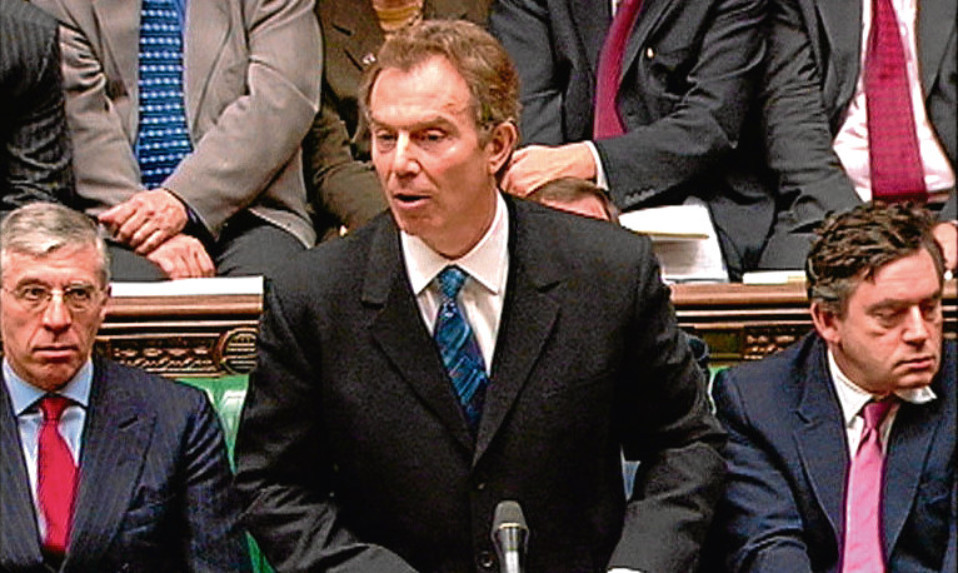The Chilcot Report into the Iraq War of 2003 has been published, revealing how Britain was betrayed by a cabinet of cowards led by a dangerously obsessed man.
Obsession describes what Chilcot has revealed about the Prime Minister, Tony Blair.
From 2001 he was discussing regime change in Iraq with the US President George W Bush.
Blair later promised to do “whatever” to support Bush in this aim.
That included refusing to challenge thin intelligence on the threat posed by Iraq, allowing his obsession to colour how the intelligence was presented to the people and failing to give ministerial guidance to Britain’s diplomatic and military representatives.
https://www.youtube.com/watch?v=zWPTr5u7odw
The list goes on – he denied other parts of government proper scrutiny of the evidence, he ignored the advice of weapons inspectors in Iraq and he went to war when, as Chilcot says, it was “not the last resort”.
Blair disregarded advice that war was likely to make matters worse in the region, made insufficient efforts to plan for the post-war rebuilding of Iraq and knew the British Army were not up to fighting in both Afghanistan and Iraq at once.
Had an ordinary man or woman from Dundee been involved in anything like the professional negligence, poor planning, causal disregard for safety or wilful manipulation of evidence as Blair, his cabinet and advisers such as Alistair Campbell have been shown to have a hand in, they would be punished severely and without regret.
Little of this is news – much of it was said by anti-Iraq war voices in 2002.
It is tragic that British soldiers died fighting a lie, knowingly exposed to death by poor planning and bad equipment but at least they had made a choice to sign up.
The hundred of thousands of others who died had no such choice.
The elected leaders of the west killed more Iraqis than the country’s own murderous dictator.
That is why Britain was betrayed – it had the supposed advantage of democratic accountability and collective responsibility for cabinet government.
Britain wasn’t a dictatorship with lackeys living in fear of a strong man, yet the politicians we charged with carrying out the simple checks of parliamentary democracy failed, abjectly so.
Their behaviour would have made sense if a gun had been put to their heads but the only threat was to their careers.
Robin Cook alone challenged the official version, saying as he resigned from his position as Leader of the House: “On Iraq, I believe that the prevailing mood of the British people is sound. They do not doubt that Saddam is a brutal dictator but they are not persuaded that he is a clear and present danger to Britain.”
We should never forget that Chilcot confirms what many suspected in 2002 and 2003 – this was not a folly in hindsight but a tragedy foretold.
What motivated Cook to resign could easily have moved others but the United Kingdom’s cabinet of 2003 was a Dead Sea of principle, a salty low point of character.
Chilcot tells us that in January 2003 the Attorney General Lord Goldsmith attended cabinet, having submitted a single sheet summary of the legal issues surrounding war.
The paper was never discussed and no questions were asked of it – the people sitting around the polished wooden table at the back of Downing Street chose not to engage with the biggest political issue of the day or the person who could have provided an excuse to stop the war.
The Chancellor of the Exchequer, Gordon Brown, conducted himself throughout this tragedy as he did in so many difficult times, by simply ducking out of the headlines and becoming invisible on the matter.
Alistair Darling was there, as was John Reid. The three of them were never shy from suggesting a principled, Scottish morality when it suited them but were speechless when faced with the defining moral call of their careers.
They were not the only Scots – Helen Liddell and Lord Irvine were there too. Any one of those five could have found the courage to open their mouths – an effort which was apparently beyond their own self interest.
Charles Clarke, Jack Straw, David Blunkett, Margaret Beckett – all of them guilty of having appealed to Labour’s “crusade” for fairness and decency in their careers, all of them patsies in the conspiracy which led to the deaths of hundreds of thousands.
These people betrayed Britain by failing to do the one job asked of them, to govern in the interests of the people. They governed for their party – and look at the mess it caused.
Had an ordinary man or woman from Dundee been involved in anything like the professional negligence, poor planning, causal disregard for safety or wilful manipulation of evidence as Blair, his cabinet and advisers such as Alistair Campbell have been shown to have a hand in, they would be punished severely and without regret.
The cabinet that brought shame on Britain and did as much as anything to tear apart the trust between government and people will not be even censured.
They have all gone on to lucrative jobs in the private sector, sinecures elsewhere in the state, their reputations untarnished, their characters visibly intact.
It is clear that Blair tried to hide the truth from his cabinet – but it is also clear the cabinet didn’t go looking for it. Both are betrayals of the people they were elected to represent.
